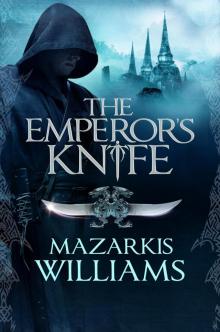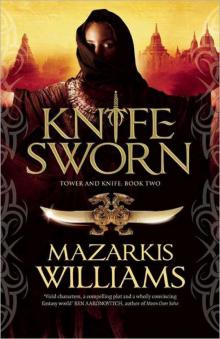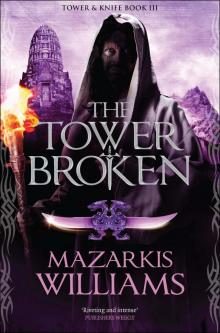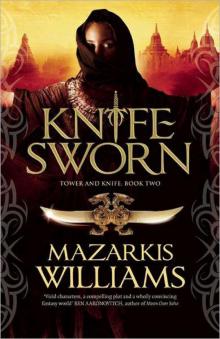- Home
- Mazarkis Williams
Knife Sworn Page 2
Knife Sworn Read online
Page 2
“I would feel silly giving such a thing to a friend,” he had told her. “You carry me inside you.”
Grada had carried him, now she carried the space where he had been. It seemed cruel to remind her and refuse her in the same breath, but then Sarmin, for all his cleverness, for all that he had shared her skin, did not truly know her. Perhaps he understood no woman, and maybe no man either. He had stepped from that room they raised him in, but she wondered if he would ever truly leave it.
In the end, Sarmin showed he knew a little more of her than he had admitted, for as she took her leave on the mission he assigned her, the emperor stepped from his throne, crouched beside her where she knelt prostrated and pressed the disk into her hand.
She twisted it now before her eyes. Straight on, you saw nothing, just a suggestion here or there. Only at an angle would the light catch on the artist’s cuts and offer up Sarmin’s features, caught in a few brief lines: as true an image as she had ever seen.
Grada slipped the disk back into her robes and stood, brushing away dust and grit. She walked on. The caravan would not halt long; they had kept a good pace for the past week.
Hours later, with the sun descending, she almost passed by the place where they had turned. She knew in other lands that tracking was an art-form, learned over a lifetime and practised with great skill. Cerana had few places where such skills mattered. Between the city and the sands lay only a thin strip of land where the ground would mark, and where the wind would leave such disturbance long enough to be of use. If the caravan had not numbered iron-shod horses among its steeds there would have been no choice but to follow closely and risk detection. Just one such print caught her eye, one half-moon, cut through the year-old flood-crust out towards the fields. The caravan had left the river road, turned from the city with little more than a day’s travel ahead.
“I want to know about the slaves brought in from the north,” Sarmin had said to her. Not in the privacy of the room they once had shared, nor in the secrecy of that link—forged, then broken—that once had bound them, but in the light and space of the throne room. Only distance kept their words from the courtiers moving about the perimeter in a bright and glittering flow; only loyalty kept their secrets within the circle of muscled backs that Sarmin’s bodyguard presented to their emperor.
“Slaves have always come from the north,” she had said. Emperor, she thought, I should have called him, my Emperor. And slaves came from all directions, drawn into Nooria to serve, grow old, die. The roads north brought white slaves, down the river, too pale for fieldwork, exotic girls for the harem, for nobles wishing to show their sophistication, populating their houses with Mythyck’s children.
“I am told that they bear watching,” he had said. Who told him such things, she wondered.
“I will watch them.” She had fallen into her prostration. An Untouchable, the emptier of night-pots, washer of moon-blood from private linen, fallen in obeisance as if she were a man of property and breeding. Azeem had told her of the damage she did, of the poison that spread where she walked.
Grada turned away from the river, along the trail of hard mud beaten to dust, the wheat rising high to either side. A watcher left along the path would know her now, a spy, following along a trail to nowhere. Grada eyed the wheat, swaying in the wind’s half-breath. Best pray they had left no watcher.
A quarter mile along the trail and the wheat had halved in height, an arid taste on the air, irrigation ditches struggling to do their duty. Grada stopped. She wriggled her toes in the dust—sand as much as dust now.
Life at the bottom of a pecking order teaches you to listen and to watch. When any hand can and will be raised against you, it pays to know where those hands are. City sounds are not river sounds, and river sounds are not desert sounds, but a keen ear will learn the ways of each. Grada didn’t hear the approach, but she heard the hidden birds fall silent, the creakerbugs pause and each small thing grow quiet until only the wheat’s rustling remained.
Grada left the trail and pushed in among the crop, careful to part the stalks so they would spring up again behind her. She went in deep enough that she could no longer see the road. Curiosity kills more than cats, and if you can see, you can be seen.
The horses came first, a distinctive clop-clop of hooves on dry mud, the jingle of harness. Grada had seen horses, the first time through the eyes of the Many, watching the empress-to-be travel the sands towards Nooria. But these were not the ponies of the grass-tribes. Rather they were the tall steeds of the west, water-hungry, fierce beasts even less suited to the sands. And after the horses, the softer plod of camels, the creak and rumble of wagons. Not a true caravan: these men had followed the longest paths and skirted the desert. Wheels would not take a traveller across the dunes.
“—wouldn’t think that meat would need seasoning—”
“—water, and feed the—”
“—volunteered to teach them some new tricks—”
And the travellers had gone, taking their conversations with them. Grada waited. Long enough for the creakers to speak and the birds to take up their song again. She emerged, flicking chaff from her robes, and resumed her course.
In half an hour the trail had gone to ruts in sand, a record of the caravan’s passage that would not survive the day. A low ridge took river and its green skirts from view, and Grada found herself on the edge of the desert, as hungry and empty as it ever was. The stone-built house and surrounding pavilions came as a surprise when Grada crested a second ridge. She went flat to the dust and crawled forward, lizard-low. The building lay a few hundred yards off, but with the sun in the west she would catch someone’s eye coming over the incline.
The hot trail scorched Grada’s palms, heat rising from the ground to bake her, gritty sand lifted by a light wind to sit between her lips, irritate her eyes.
“What are you doing here, Grada?” Sometimes she spoke to herself. Since the voices of the Many had been taken, it comforted her to hear her own from time to time. Somehow speaking a thought made it more real, gave it weight.
The gods had plucked her from a life of drudgery and certainty only to replace it with another kind of purpose, a camaraderie of a different sort, the bonds of caste replaced with the pattern. But now? Alone, and with choices outnumbering instructions as sand grains outnumber dunes, Grada felt unmade. A needle with no eye, Jenna would have called her.
A man led a chain of girls from the largest of the pavilions: five of them, walking as if still bound together. Some ties remain, even when cut. Five girls—three blonde, two redheads, exotics from Mythyck and the Scyhtic Isles beyond—still wearing the rags from their homelands.
“See how he keeps them waiting by the school? No care for whether the sun stains them.” A male voice behind her, calm, without threat.
Grada kept very still, ice on her shoulders. If he had wanted her dead he could have killed her already.
“School?” she asked.
“The last girls were here three months. Only two of them. Those two went out with the caravan that brought these ones.”
What would they spend three months doing out in the folds of the desert? Grada didn’t ask. Instead she asked herself what the man wanted. Such questions came as naturally as breathing. Survival as an Untouchable, as a creature whose life was the property of all and any, required that you ask yourself at each turn what every person wanted of you. Grada had been a creature lower than a slave—slaves at least commanded a price, and despite the fact that she had held the hand of the emperor her birth still tainted her, her eyes dark with the sin of her ancestors. He wants me to answer my own question.
“They are training them,” she said.
“Because?”
“Because…” Grada had never seen a skin so pale until the high mage had led her from Sarmin’s room to the Tower, where she saw her first northerner, a wind-sworn mage. She thought to say the girls were in training for the Tower, to serve the empire, but why here? No, they were not ma
ges; one northerner might live in the Tower but many more lived beneath Sarmin’s golden roofs, proof of his power and wealth. “Because only the richest can afford exotics.”
“That’s my assessment of it,” the man said.
Grada rolled to her side, a slow move, so as to provoke no attack. The man squatted a few yards behind her, off the trail, his robes the colour of sand.
“My name is Rorrin,” he said, veiled as the dunes-men are wont to ride, the sun throwing his shadow before him, short and dark.
“Are you here to kill me?” Grada asked. The fear that eluded her between the river and the pomegranate trees now sent sweat trickling, warm from beneath her arms. She sat, shuffling back from the view of the school.
“Do I look like a killer?” The man pulled his veil about his neck and set back his sun hood. Old, maybe fifty, a comfortable face sagging beneath short grey hair.
“No.” She knew killers, the kind who strode the Maze or bore the emperor’s swords. Many wore it openly in the brutal lines of their face. Others hid it, but for those used to looking, their true nature lay revealed—something of steel about them, in the eyes, in the quiet way they held their peace in chaos, waiting to strike.
“Well, then.” He smiled.
Not a killer. A murderer maybe. Murder lies deeper in a man. “Why are you here, then?” she asked.
“To watch, of course. And better to be away from the trail when you watch. You never know who might come up behind you.” His eyes told a story of kindness, dark but warm.
“And who sent you?” The man who killed Jenna, who cut her body with a sharp knife as if he had been looking for something hidden within, that man had kind eyes.
“We both serve the same person, Grada,” Rorrin said. “Have you seen enough, or should we wait?”
“How long have you been watching?” she asked.
“Four days.” He waggled a sun-dark hand as if it might be more, might be less.
“Another won’t hurt, then.” And Grada rolled to her stomach and crawled back to the ridge, and away from the trail.
CHAPTER TWO
GRADA
“Tell me why you let them live.” Rorrin had lain silent in the dust and heat beside Grada while the sun rolled slow across the sky. Now as the dunes beyond the compound started to throw shadows, he spoke.
“Who?” she asked.
Rorrin said nothing, not dignifying her pretence, his gaze on the buildings where the slaves had been taken.
Grada let the breath slip from her, a sigh she hadn’t known was in her. “I’m not a killer.”
“To lie to me again would be a mistake.” Rorrin’s voice held no threat, as mild as if they discussed the shade of the sand.
“I…” That pale face stared sightless at her again from beneath the water. “I didn’t want to hurt them.”
“Now you’re just lying to yourself.”
Rorrin wrinkled his nose to dislodge a fly. Not so many this far from the river but enough to annoy. It flew Grada’s way. A shiver of irritation ran through her, not at the fly, the Maze lay black with them in some months, but at the discovery Rorrin was right.
“You said you’d been watching here four days. How could you even know…”
“I said I’d been watching four days. I didn’t say here, Grada.”
“Watching me?” With effort she unclenched the fists she’d made. “Why?”
“Answer my question. I asked first,” Rorrin said.
“They didn’t deserve to die,” she said. “It would have been too easy. I wanted them to know what had happened, to remember me, to hurt, to have it in their minds the next day, the next year.”
“Death would have been a mercy?”
“Yes.” The face again, hair flowing with the current, the river sliding between them. It would have been too easy for him, to slip away with the river.
“And you weren’t feeling merciful?”
“No.” Grada watched the man beside her, his profile as he stared across the ridge at the distant building. “Now answer my question—why were you watching me?”
“I didn’t say I would answer you, just that I asked first.”
Grada pushed herself up, started to rise. “If you think—”
“Down!” A command. “Our friends are on the move!”
The three blonde girls. No, three blonde girls, but perhaps not the same ones. Grada learned that from the shell-game played on shaded corners where the Maze opened onto the wider streets of Nooria. “Watch the pea! Watch the pea!” the man would call, his hands blurring as he swapped the shells. And any honest passerby who tried to watch that pea would lose it just as they lost sight of the wider game.
“Each to a different pavilion,” Rorrin said.
Grada had started to think that Rorrin only spoke to test her. “They’re dividing them—setting doubt in their minds so any groups that formed on the journey here are broken.”
“It seems likely,” Rorrin said.
“We should have followed the caravan,” Grada said. “If it included trained slaves from this school we’d learn more from where those were taken than from watching the outside of the tents and building in which these ones are being trained.”
“Yes.” Rorrin showed no concern.
“You weren’t alone.”
“No,” he said.
“If we move fast we might still catch them before they reach the city gates.” Grada scooted back across the ground, half sand, half dust, and stood out of sight from the school.
Rorrin followed her, his pace a sensible one but too slow to suit her mood. She waited for him at a milestone. Such stones counted out the first hundred miles from the city—this one read “twenty” in the old script of lines and dots.
“We may lose them in the city,” she said as he drew closer, river dust scuffing under his sandals.
“Meere will not lose them.” Rorrin watched her face as if he had asked her a question.
“Answer my question,” she said. “Why have you followed me?” Rorrin seemed almost uninterested in the slaves, as if she herself were the quarry that mattered to him.
A shrug. “Is it only the emperor’s enemies who must train new agents for the fight?” He stepped closer, close enough that she could see the sweat on his brow, the grey stubble above his lip.
“I’m not a fighter.” The idea pulled a laugh from her. “I’m an Untou—”
His hand was on her shoulder, a move of shocking swiftness. “I touched you. Be something new.”
The echoes rose from the base of her skull, old whispers hissing repetition.
A sharp edge demands a cut. Quick hands kill, quick hands kill. Aristo touched me so.
She took his wrist and lifted his hand away. There had been an Aristo… was that voice hers? A memory?
“You don’t have to be a warrior to fight for the emperor. The Tower fights his battles, the alchemists in the Tun, spies who live new lives in far corners beyond the edge of empire.” Rorrin smiled. “Give me my hand back.”
Grada let him go and in a flicker he held her wrist instead, one finger digging down into a nerve that made her cry out and almost fall to her knees. She kept standing though, snarling at the pain.
“You’re too used to doing what is asked of you, Grada.” He let her go. “Can you unlearn that lesson of a lifetime and show that same obedience to only one man?”
The pain subsided in waves as Grada cradled her arm. “I serve the emperor, nobody else.”
“Well next time I ask to have my hand back, consider saying no.” And he walked on by, sandals scuffing.
They walked through the cool of the night with the blazing stars to light a moonless path. The love song of ten thousand frogs accompanied them, and the river’s sigh as it slipped past unseen.
Grada slapped her neck and brought her hand away dark-smeared with blood and pieces of mosquito.
Rorrin snorted at her side. “The death of a thousand bites. The emperor—”
“You d
on’t have to make every damn thing an… an…”
“Allegory?”
“Yes, one of them.” Grada didn’t know the word, but it sounded right. “A story about the emperor or a lesson or—”
Rorrin pressed something into her hand. “The emperor gave me these.”
Grada looked. Dark objects, rounded, small. A sniff—the faint scent of lemons, bitter lemons.
“Citronel pods. Crush them and wipe the juice on. The blood-suckers won’t want you.”
“Sarmin gave you these?” Grada asked.
“Emperor Beyon. He hated mosquitoes. The things will drink royal blood soon as take from peasants.”
“You knew Beyon? Was he like Sarmin?”
Out in the darkness a whip-o-will unleashed its cry, like a shriek of agony.
“You can’t see the emperor as a friend, Grada. That will make trouble for you and for him. And no, Emperor Beyon was nothing like his brother. He would never have spoken to an untouchable and his friendship was… dangerous. Apt to be pulled away as swiftly as it was given. He had a quick temper.”
“They say he was a great emperor. The people loved him in the city.” Jenna had always offered prayers for Beyon. And to him, which made no sense.
“The people adored him because he did nothing. They loved him because we had peace and times were good.”
“It doesn’t sound as if you loved him.” And if not Beyon, did Rorrin love Sarmin?
“The gods gave us the emperor that we deserved at that time and the emperor we needed at that time. It’s not my place to love the emperor, only to serve him. If the call came I would have laid down my life to obey Beyon with no delay, while the peasants were wondering just how much they liked him after all. The emperor is Cerana. Cerana is the people. I serve.”
Grada crushed the pods and the mosquitoes left her alone while she pondered. Dawn found them still walking. With the sun still flowing up over the rim of the desert they saw the caravan ahead, circled and camped. Rorrin appeared not to see it and Grada broke her silence.

 The Emperor's knife
The Emperor's knife Knife Sworn tak-2
Knife Sworn tak-2 Tower & Knife 03 - The Tower Broken
Tower & Knife 03 - The Tower Broken Knife Sworn
Knife Sworn